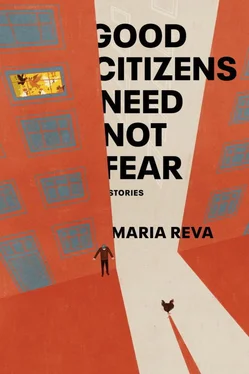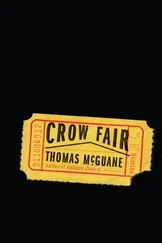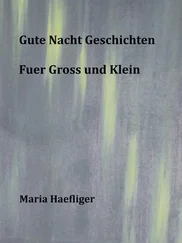Maria Reva - Good Citizens Need Not Fear - Stories
Здесь есть возможность читать онлайн «Maria Reva - Good Citizens Need Not Fear - Stories» весь текст электронной книги совершенно бесплатно (целиком полную версию без сокращений). В некоторых случаях можно слушать аудио, скачать через торрент в формате fb2 и присутствует краткое содержание. Город: New York, Год выпуска: 2020, ISBN: 2020, Издательство: Doubleday, Жанр: Современная проза, humor_satire, на английском языке. Описание произведения, (предисловие) а так же отзывы посетителей доступны на портале библиотеки ЛибКат.
- Название:Good Citizens Need Not Fear: Stories
- Автор:
- Издательство:Doubleday
- Жанр:
- Год:2020
- Город:New York
- ISBN:978-0-38554-529-7
- Рейтинг книги:3 / 5. Голосов: 1
-
Избранное:Добавить в избранное
- Отзывы:
-
Ваша оценка:
- 60
- 1
- 2
- 3
- 4
- 5
Good Citizens Need Not Fear: Stories: краткое содержание, описание и аннотация
Предлагаем к чтению аннотацию, описание, краткое содержание или предисловие (зависит от того, что написал сам автор книги «Good Citizens Need Not Fear: Stories»). Если вы не нашли необходимую информацию о книге — напишите в комментариях, мы постараемся отыскать её.
Good Citizens Need Not Fear: Stories — читать онлайн бесплатно полную книгу (весь текст) целиком
Ниже представлен текст книги, разбитый по страницам. Система сохранения места последней прочитанной страницы, позволяет с удобством читать онлайн бесплатно книгу «Good Citizens Need Not Fear: Stories», без необходимости каждый раз заново искать на чём Вы остановились. Поставьте закладку, и сможете в любой момент перейти на страницу, на которой закончили чтение.
Интервал:
Закладка:
PART TWO
After the Fall
LUCKY TOSS
I’d been working as a guard at the saint’s tomb for eighteen months before the trouble began. Konstantyn Illych paid me little but provided free lodging—an army cot and stove I could fold out in the corner of the tomb each night. The job consisted of telling pilgrims to keep hands out of pockets and lips off the display case. Sometimes children rapped the glass, bored by the saint’s inactivity, and I would remind them that we were not a zoo.
The saint’s display case, which Konstantyn Illych bought from a defunct delicatessen shop at quarter price, boasted a curved glass front and a steel ledge with tracks for plastic trays. Normally the saint basked under the fluorescent lamp like a glazed roast, but that particular day the bulb began to flicker, making the creature look as though it were twitching awake. At first the effect pleased Konstantyn Illych, who wanted the crowd of pilgrims to grow even thicker, but after the second pilgrim fainted he asked me to procure a replacement bulb—though not before we closed the tomb, at 18:30.
The tomb was a low-ceilinged concrete room in the crumbling building known as 1933 Ivansk. The room was bare as a bunker, containing only the display case, a narrow counter for the cash register, and a small bathroom (not for public use). Before being a tomb it had been a hair salon and before that, a ground-level suite. The owner of the salon had knocked out the street-facing wall and replaced it with glass panes. When Konstantyn Illych bought the space, he knocked out the inner walls, too, to make room for the pilgrims. That the rest of 1933 Ivansk had not yet collapsed on us almost made me believe in the saint.
I’d approached Konstantyn Illych about the position after the Union fell and job prospects plummeted. He had already fired two guards for their substandard work ethic. Despite our unfortunate history—the letter of apology he never wrote or signed—we had reached a truce; I blamed him for ruining my career at the agency, and he blamed his failed marriage on the distress I’d caused, and so we were even. Even, but not equal, and Konstantyn Illych enjoyed reminding me of this fact: as my new boss he reveled in assigning me pointless tasks, such as dusting the insides of locks and buffing the stainless steel screws of the display case. I’d reached a similarly uneasy peace with Milena Markivna, who had returned to the building but not to Konstantyn Illych. For the past few months she’d been living on the ninth floor with a stylish young woman named Larissa and her two daughters, but Konstantyn Illych’s repeated assertions that the women were merely roommates made me suspect they were more. Of course, I dared not ask Milena Markivna myself. The only time she and I had spoken since her return, she’d joked that I had finally realized my dream of becoming an Honor Guard. But I sensed my presence embarrassed her—I was a sticky residue from a past she longed to forget.
Most of the tomb’s visitors were women and children. They laid portraits of men atop the display case. When the town’s canning combine had closed, the men had taken to the sunflower fields, drinking cheap perfumes with flip-top caps, the brightly colored bottles shaped like grenades. Now, every evening, the men’s portraits rustled like dead leaves as I swept them away.
We permitted photography inside the tomb. Konstantyn Illych believed it helped spread the word. Visitors loved snapping close-ups of the saint’s teeth, a speckless set of ivories better preserved than any other saint’s and certainly than any Kirovkavite’s, dead or living. We townspeople all carried stomatological trauma, our mouths junk heaps of lead fillings, wire bridges, steel crowns, plastic prostheses. When the pilgrims peered into the saint’s mouth—eternally thrown open, a model patient—they must have been transported to a happier time.
Most of the attention in the tomb centered on the saint, but on occasion I’d catch a pair of eyes on me. A glint of recognition, and perhaps contempt. Likely I imagined this. When the newspapers had begun publishing lists of names from declassified archives, I’d searched for mine but had not seen it. I did find an ex-colleague’s name, from the agency. He must have found it, too—or worse, his family had. The next time his name appeared in the paper, it was to announce that he had hanged himself, “unable to bear the burden of his crimes.” He had been much older than I, had operated in a different time. My tasks had been confined to the desk, and I’d never wielded anything larger than a pen.
Spotlights, striplights, pot lights, floodlights. There are myriad ways to illuminate a delicatessen display case, I learned at the hardware tent at the bazaar.
Most of the concrete storefronts sat empty, as they had before the Union’s collapse, but the tents of the bazaar now sprawled ten blocks, selling anything from cow hooves to floppy disks. These tents sprouted and folded at an alarming speed; if one waited too long, it was impossible to find the same vendor twice. I hated this place, with its tantalizing colors and wafts at ever-inflating prices. I always came away feeling poorer, even if I hadn’t spent a single kupon. The conundrum of former times—having money with nothing to spend it on—had been cruelly inverted.
“Are you displaying meat or fish?” the hardware sales boy yelled at me over the rattle of the electric generator by his feet. “Pastries? Greens?” He looked about fourteen and smelled of pomade. Behind him, a wall of shelves gleamed with a dizzying array of light fixtures. A few blinked and/or changed colors.
I didn’t want to explain. “Meat.”
“Fresh or cured?”
“Cured.”
The sales boy warned against fluorescent bulbs, which made meat look blue; high-UV lights drained flesh to an unlively gray; incandescent bulbs promoted rotting. He insisted on halogen, which reacted with tungsten and brought out meat’s natural blush. To demonstrate, he posed his face beside a bulb shaped like a tiny satellite dish. Indeed, a before-unseen pimple on his chin glowed a freshly squeezed red. “A halogen bulb sells your product for you,” he assured.
A halogen bulb cost two hundred kupony and Konstantyn Illych had given me fifty.
“A regular bulb will do,” I said.
The boy puckered his lips, now crimson, as if painted with lipstick. “A halogen bulb pays for itself,” those lips promised.
When I showed the boy my lone bill, his enthusiasm wilted. Again I missed the years when one had fewer choices, fewer ways to disappoint.
The next day I woke at dawn. Konstantyn Illych had instructed me to change the bulb before the crowds of pilgrims arrived outside the tomb and gathered along the glass wall, so as not to detract from the mystique of the saint. I had several times suggested installing curtains to pull over the glass, but Konstantyn Illych said he did not have the money. I doubted this was true. All those coins, warm from pilgrim palms, must have amounted to a weighty sum. And I knew Konstantyn Illych was currently renovating his suite nine stories above. He had wedged an extra room into it, for his runaway foster child. She’d been gone for over a year, but Konstantyn Illych awaited the girl like the pilgrims awaited their savior. He’d even bought her a new wardrobe, in four different sizes, anguished that he couldn’t know how much she had grown.
I unlocked the saint’s display case, slid open its rear door. The smell of oil and dirt burst forth, as if something had been uprooted from the parched earth. I tried to unscrew the spent bulb, contorting my arms to avoid grazing the body, but the bulb had fused to its rusty socket. I could not work while the saint remained inside the case.
Читать дальшеИнтервал:
Закладка:
Похожие книги на «Good Citizens Need Not Fear: Stories»
Представляем Вашему вниманию похожие книги на «Good Citizens Need Not Fear: Stories» списком для выбора. Мы отобрали схожую по названию и смыслу литературу в надежде предоставить читателям больше вариантов отыскать новые, интересные, ещё непрочитанные произведения.
Обсуждение, отзывы о книге «Good Citizens Need Not Fear: Stories» и просто собственные мнения читателей. Оставьте ваши комментарии, напишите, что Вы думаете о произведении, его смысле или главных героях. Укажите что конкретно понравилось, а что нет, и почему Вы так считаете.












